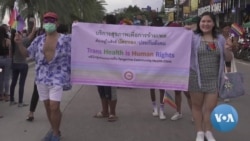For nearly 50 years Tiffany's Show Pattaya, a cabaret in eastern Thailand, has been a venue for pageantry and a haven for transgender people, providing jobs, skills and a rare platform during times when gender equality was little understood and far from Thai political debate.
But as Tiffany's marked global Pride Month on June 25 by hosting the world's biggest transgender pageant — Miss International Queen — the wider battle for equality in Thailand has never been closer to being won.
After years of campaigning by LGBTQ activists, Thai lawmakers are considering several bills, some of which could legalize same-sex unions, and in the process make Thailand only the second place in Asia to do so, after Taiwan.
But a Thai parliament stacked with conservative army-aligned politicians stands in their way.
It will ultimately decide which — if any — of the range of bills becomes law.
The most progressive under consideration is the Marriage Equality Bill, which recognizes same-sex marriages and affords legal rights, including adoption and inheritance.
It passed its first reading on June 15 on a wave of public support driven by Thailand's progressive youth.
"Let's wait and see if the bill passes the next readings," said Kwanlada Rungrojampa, Thailand's representative at Miss International Queen.
"At face value, Thailand may seem like we have gender equality, but legally speaking we do not."
To change that, the bill must survive committee hearings and two more parliamentary votes. There are concerns a watered-down version — called the Civil Partnership bill — may emerge in its place.
Sponsored by the government of Prayuth Chan-O-Cha, who draws his support mainly from older, conservative forces tied to the establishment, that bill's wording allows for civil unions but stops short of the full rights protected by marriage.
"The majority of lawmakers are seniors, so any changes are difficult to make … they are the generation of change-resistors," said Alisa Phantusak, whose father established Tiffany's as a leading Pattaya tourist attraction in 1974.
"This law shouldn't be hard to pass. The bottom line is very simple — equality."
'This is it'
After years of false starts on gender rights and equality in the kingdom, there is widespread concern that any law that finally makes it onto the statute books will fail to significantly move the dial.
"Conservatives are still very worried about how it might affect religious groups as well as the pre-existing social expectations upheld by heterosexual couples," said Kath Khangpaiboon, an academic at Bangkok's Thammasat University and a long-time gender equality advocate.
Ultimately, political timing may hold the keys, she said, explaining Prayuth's widespread unpopularity may lead him to feed his conservative political base rather than move with the moment.
"Thanks to the vibrant social movement during Pride Month, parliament may have felt the pressure to pass the first reading of the Marriage Equality Bill," Kath said.
"But let's not forget that the Prayuth government is on their way out in terms of reputation… and a general election is just around the corner."
On Saturday night (June 25) Miss Philippines Fuschia Anne Ravena won the Miss International Crown from contestants from as far apart as Puerto Rico and Laos, Japan and India.
But away from the glamour, the contestants shared stories of discrimination from their countries — as well as hope for a world moving slowly, if patchily, towards greater recognition of their gender.
"(In Honduras) You cannot be free…. you are judged, you don't have the right to have a job, to decent healthcare, to study," said Luciana Romero, representing Honduras.
"That is why I live in the United States. I am free there…it has given me that space, it has given me love, it has given me understanding."
For Catalina Cabella, a full-time nurse who works in Manhattan, the chance to compete (as Miss USA) is a sign of how fast societies in some countries are moving — often leaving the law struggling to catch up.
"We're getting the spotlight and we have a chance to share some really big messages that could possibly change the perspective of our peers," she said, describing pageantry as another part of her "humanitarian mission" alongside nursing.
"This is it…we're here," she said.









